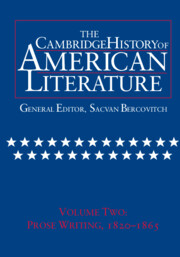Book contents
- Frontmatter
- Introduction
- CONDITIONS OF LITERARY VOCATION
- THE LITERATURE OF EXPANSION AND RACE
- THE TRANSCENDENTALISTS
- 1 Unitarian Beginnings
- 2 The Assault on Locke
- 3 Carlyle and the Beginnings of American Transcendentalism
- 4 “Annus Mirabilis”
- 5 The Establishment and the Movement
- 6 Letters and Social Aims
- 7 The Hope of Reform
- 8 Diaspora
- 9 The Antislavery Years
- NARRATIVE FORMS
- Chronology
- Bibliography
- Index
3 - Carlyle and the Beginnings of American Transcendentalism
from THE TRANSCENDENTALISTS
Published online by Cambridge University Press: 28 March 2008
- Frontmatter
- Introduction
- CONDITIONS OF LITERARY VOCATION
- THE LITERATURE OF EXPANSION AND RACE
- THE TRANSCENDENTALISTS
- 1 Unitarian Beginnings
- 2 The Assault on Locke
- 3 Carlyle and the Beginnings of American Transcendentalism
- 4 “Annus Mirabilis”
- 5 The Establishment and the Movement
- 6 Letters and Social Aims
- 7 The Hope of Reform
- 8 Diaspora
- 9 The Antislavery Years
- NARRATIVE FORMS
- Chronology
- Bibliography
- Index
Summary
By the time Frederic Henry Hedge had published his review of Coleridge's career in the Christian Examiner another writer had already begun to take Coleridge's place as supplier of excitations to the New World, a writer who was less interested in metaphysics than he was in the conduct of life. In the 1820s a remarkable series of review essays about German literature began to appear in the British quarterlies and attract the attention of the young Boston liberals. The style of these reviews – passionate, urgent, full of humor and outrage – marked them off immediately from the urbane acidities surrounding them. The reviews were written by Thomas Carlyle (1795–1881), who had been translating German literary works and writing essays about German literature in the 1820s and early 1830s. Carlyle's essay on the German writer known as Jean Paul (Jean Paul Friedrich Richter, 1763–1825) appeared in the Edinburgh Review in 1827, followed in the same year by an essay on “The State of German Literature.” In 1828 Carlyle published two essays in the Foreign Review: an analysis of the “Helena” episode from the second part of Goethe's Faust and a later essay on Goethe's whole career. In 1828 and 1829 the Edinburgh Review published Carlyle's long biographical essays on the German classical scholar Christian Gottlob Heyne (1729–1812) and on the German poet and novelist Novalis (1772–1801). A London magazine, Eraser's, published Carlyle's review of the correspondence of Goethe and Schiller in 1831. In December 1831, Carlyle published in the Edinburgh Review his long and important essay “Characteristics,” occasioned by the posthumous publication of Friedrich von Schlegel's Philosophische Vorlesungen.
- Type
- Chapter
- Information
- The Cambridge History of American Literature , pp. 362 - 375Publisher: Cambridge University PressPrint publication year: 1995



